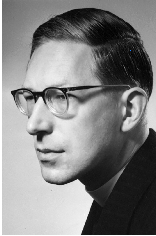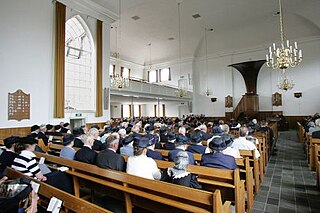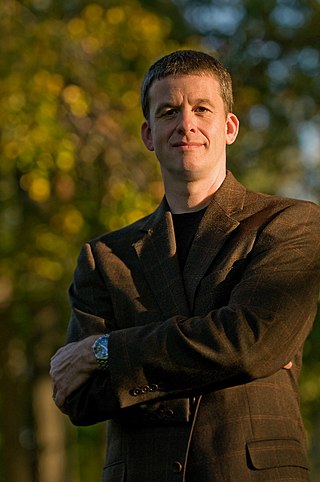Christian fundamentalism, also known as fundamental Christianity or fundamentalist Christianity, is a religious movement emphasizing biblical literalism. In its modern form, it began in the late 19th and early 20th centuries among British and American Protestants as a reaction to theological liberalism and cultural modernism. Fundamentalists argued that 19th-century modernist theologians had misunderstood or rejected certain doctrines, especially biblical inerrancy, which they considered the fundamentals of the Christian faith.
Biblical inerrancy is the belief that the Bible "is without error or fault in all its teaching"; or, at least, that "Scripture in the original manuscripts does not affirm anything that is contrary to fact". Some equate inerrancy with biblical infallibility; others do not.
James Montgomery Boice was an American Reformed Christian theologian, Bible teacher, author, and speaker known for his writing on the authority of Scripture and the defence of Biblical inerrancy. He was also the Senior Minister of Tenth Presbyterian Church in Philadelphia from 1968 until his death.

James Innell Packer was an English-born Canadian evangelical theologian, cleric and writer in the low-church Anglican and Calvinist traditions. He was considered one of the most influential evangelicals in North America, known for his best-selling book Knowing God, written in 1973, as well as his work as an editor for the English Standard Version of the Bible. He was one of the high-profile signers on the 1978 Chicago Statement on Biblical Inerrancy, a member on the advisory board of the Council on Biblical Manhood and Womanhood, and also was involved in the ecumenical book Evangelicals and Catholics Together in 1994. His last teaching position was as the board of governors' Professor of Theology at Regent College in Vancouver, British Columbia, in which he served from 1996 until his retirement in 2016 due to failing eyesight.

The Evangelical Theological Society (ETS) is a professional society of Biblical scholars, educators, pastors, and students "devoted to the inerrancy and inspiration of the Scriptures and the gospel of Jesus Christ" and "dedicated to the oral exchange and written expression of theological thought and research."
Biblical hermeneutics is the study of the principles of interpretation concerning the books of the Bible. It is part of the broader field of hermeneutics, which involves the study of principles of interpretation, both theory and methodology, for all forms of communication, nonverbal and verbal.
Biblical infallibility is the belief that what the Bible says regarding matters of faith and Christian practice is wholly useful and true. It is the "belief that the Bible is completely trustworthy as a guide to salvation and the life of faith and will not fail to accomplish its purpose."

Robert Charles Sproul was an American Reformed theologian and ordained pastor in the Presbyterian Church in America. He was the founder and chairman of Ligonier Ministries and could be heard daily on the Renewing Your Mind radio broadcast in the United States and internationally. Under Sproul's direction, Ligonier Ministries produced the Ligonier Statement on Biblical Inerrancy, which would eventually grow into the 1978 Chicago Statement on Biblical Inerrancy. Along with Norman Geisler, Sproul was one of the chief architects of the statement. Sproul has been described as "the greatest and most influential proponent of the recovery of Reformed theology in the last century."

Biblical inspiration is the doctrine in Christian theology that the human writers and canonizers of the Bible were led by God with the result that their writings may be designated in some sense the word of God. This belief is traditionally associated with concepts of the biblical infallibility and the internal consistency of the Bible.
Biblical literalism or biblicism is a term used differently by different authors concerning biblical interpretation. It can equate to the dictionary definition of literalism: "adherence to the exact letter or the literal sense", where literal means "in accordance with, involving, or being the primary or strict meaning of the word or words; not figurative or metaphorical".

Reformed fundamentalism arose in some conservative Presbyterian, Congregationalist, Reformed Anglican, Reformed Baptist, Non-denominational and other Reformed churches, which agrees with the motives and aims of broader evangelical Protestant fundamentalism. The movement was historically defined by a repudiation of liberal and modernist theology, the publication (1905–1915) entitled, The Fundamentals, and had the intent to progress and revitalise evangelical Protestantism in predominantly English-speaking Protestant countries, as well as to reform separated churches according to the Bible, historic expression of faith and the principles of the Reformation. The Fundamentalist–Modernist controversy, and the Downgrade controversy, kindled the growth and development of reformed fundamentalism in the United States and the United Kingdom. Reformed fundamentalists have laid greater emphasis on historic confessions of faith, such as the Westminster Confession of Faith.
Norman Leo Geisler was an American Christian systematic theologian, philosopher, and apologist. He was the co-founder of two non-denominational evangelical seminaries.
Christian apologetics is a branch of Christian theology that defends Christianity.
Denis O. Lamoureux holds a professorial chair of science and religion at St. Joseph's College at the University of Alberta, in Edmonton, Alberta, Canada. He has doctoral degrees in dentistry, theology, and biology. The author of Evolutionary Creation and of I Love Jesus and I Accept Evolution, he has also written Darwinism Defeated? The Johnson-Lamoureux Debate on Biological Origins, on the creation–evolution controversy.
Malcom Ollie "Mal" Couch, Jr. was the founder and first president of the Tyndale Theological Seminary. He was a pastor, an author of many books, and writer of 40 documentaries on Bible prophecies and biblical issues. While president of Tyndale Theological Seminary Couch recruited some very well known scholars and Bible teachers to teach the student body. Dr. Norman Geisler, Dr. Paige Patterson, Dr. Robert Lightner, Dr. Arnold G. Fruchtenbaum, and Paul Enns were used in the educational endeavors at Tyndale Seminary. After Dr. Couch retired from Tyndale Seminary he became a Vice President of the Scofield Graduate School and Seminary located in Modesto, California.
Bruce K. Waltke is an American Reformed evangelical professor of Old Testament and Hebrew. He has held professorships in the Old Testament at Dallas Theological Seminary, Regent College in Vancouver, British Columbia, Westminster Theological Seminary in Philadelphia, Pennsylvania, Reformed Theological Seminary in Orlando, Florida, and Knox Theological Seminary in Ft. Lauderdale, Florida.
Roger R. Nicole was a native Swiss Reformed Baptist theologian and proponent of Christian egalitarianism and biblical inerrancy. He was an associate editor for the New Geneva Study Bible, assisted in the translation of the New International Version, and was a founding member of both the International Council on Biblical Inerrancy and the Evangelical Theological Society, serving as president of the latter in 1956.

Michael R. "Mike" Licona is an American New Testament scholar, author, and Christian apologist. He is Professor of New Testament Studies at Houston Christian University, Extraordinary Associate Professor of Theology at North-West University and the director of Risen Jesus, Inc. Licona specializes in the resurrection of Jesus, and in the literary analysis of the Gospels as Greco-Roman biographies.
Peter Eric Enns is an American Biblical scholar and theologian. He has written widely on hermeneutics, Christianity and science, historicity of the Bible, and Old Testament interpretation. Outside of his academic work Enns is a contributor to HuffPost and Patheos. He has also worked with Francis Collins' The BioLogos Foundation. His book Inspiration and Incarnation challenged conservative/mainstream Evangelical methods of biblical interpretation. His book The Evolution of Adam questions the belief that Adam was a historical figure. He also wrote The Bible Tells Me So: Why Defending Scripture Has Made Us Unable to Read It and The Sin of Certainty: Why God Desires Our Trust More than Our 'Correct' Beliefs.

Robert David Preus was an American Lutheran pastor, professor, author, and seminary president.





